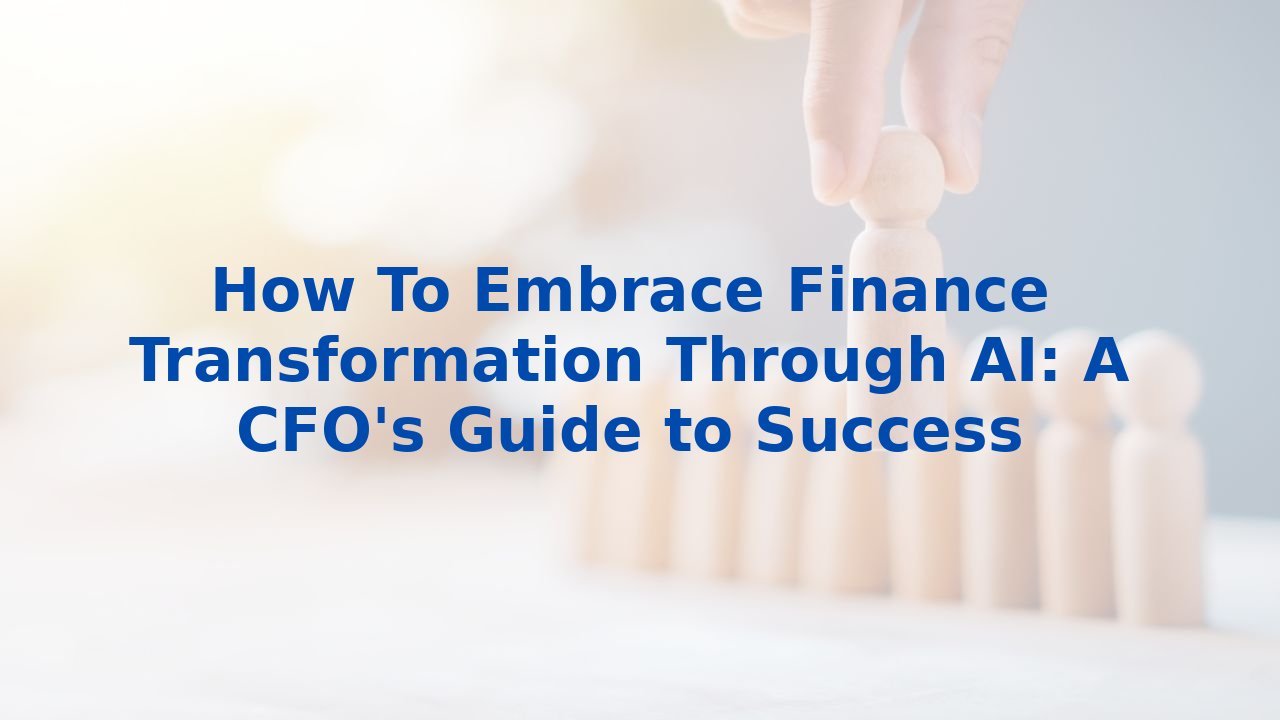How To Embrace Finance Transformation Through AI: A CFO's Guide to Success
Embracing Finance Transformation Through AI: The CFO's New Frontier
In a rapidly evolving business landscape, finance transformation has emerged as a critical priority for Chief Financial Officers (CFOs) around the globe. Recent surveys reveal that a staggering 76% of global CFOs are actively investing in automating processes and systems to either enhance existing operations or innovate for future growth. In this climate, understanding how finance can leverage new technologies, especially Artificial Intelligence (AI), is essential for driving efficiency and effectiveness.
Strategic Alignments: Integrating Finance with Business Goals
The first step in the finance transformation journey is aligning the finance function's strategy with the organization's overarching business strategy. CFOs must ask critical questions: How do financial processes contribute to strategic goals? What role do they play in fostering sustainable growth?
AI can significantly enhance this alignment by providing real-time insights into financial performance. By leveraging data analytics, organizations can create a clear picture of where resources are being allocated, and how those allocations align with long-term goals. Enhanced forecasting abilities powered by AI not only help in mitigating risks but also enable CFOs to make informed, strategic decisions that drive growth.
Standardization and Automation: The Tech-Driven Shift
As businesses pursue finance transformation, standardization and automation play crucial roles. Traditional finance tasks are often time-consuming and prone to human error. By harnessing AI, organizations can automate repetitive processes such as data entry, transaction processing, and reporting, thus allowing finance teams to focus on strategic planning rather than menial tasks.
Moreover, standardization of financial processes through AI fosters consistency and accuracy. Automated systems can ensure uniform data handling, leading to better compliance and fewer discrepancies. By streamlining these routines, organizations not only cut costs but also increase efficiency and speed, enabling them to adapt quickly to changing market conditions.
Talent Development: Preparing the Workforce for New Technologies
A pivotal aspect of finance transformation is talent development. As organizations embrace AI, the nature of work is shifting, necessitating a workforce that is both skilled and adaptable. This evolution highlights the importance of augmenting existing talent through training and upskilling.
Investing in employee training for AI skills equips teams with the tools they need to navigate the transformation process. With AI learning initiatives, employees become adept not just in leveraging technology, but in interpreting the data AI generates, leading to more nuanced decision-making. The focus shifts from rote tasks to enabling analytical thinking, forging a culture that embraces innovation and agility. For organizations looking to equip their workforce with AI skills, tailored training programs can be a game-changer.
Measuring Outcomes: Establishing Key Performance Indicators
Establishing clear goals and Key Performance Indicators (KPIs) is vital for evaluating the success of finance transformation initiatives. AI plays a role here too, offering analytical tools to assess progress effectively.
Organizations can utilize AI to monitor performance metrics automatically, enabling CFOs to track the impact of their investments in finance transformation. By analyzing outcomes against predetermined success metrics, organizations can identify areas for improvement and capitalize on successful strategies. This continuous feedback loop not only enhances accountability but also ensures that the finance function is always aligned with broader business objectives.
Conclusion: The Path Forward
The call for finance transformation is louder than ever, especially as 76% of global CFOs recognize the necessity of embracing automation and new technologies like AI. By prioritizing strategic alignment, standardization and automation of processes, talent development, and outcome measurement, organizations can navigate this transformative journey with confidence.
In an age where efficiency is not just an advantage but a necessity, the fusion of finance and AI offers clear pathways to operational excellence. As organizations embark on this exciting journey, investing in the training and development of staff will empower them to maximize the potential of AI in finance, setting the stage for sustainable growth and innovation.
“The future of finance isn't about replacing jobs, but rather enabling a new era of efficiency and insight.”
As you consider your own organization's approach to finance transformation, remember that embracing AI is not just about technology—it's about harnessing the collective potential of people and processes to forge a brighter future.



